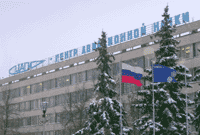|
 The Central Aerohydrodynamic Institute (TsAGI) was founded on December 1, 1918 under the initiative and leadership of N. E. Zhukovsky, the father of Russian Aviation. Today?s TsAGI is the largest scientific research center in the world. Under the Russian Federation Government Decree No. 247 of March 29, 1994 TsAGI was designated a State Research Center. The Central Aerohydrodynamic Institute (TsAGI) was founded on December 1, 1918 under the initiative and leadership of N. E. Zhukovsky, the father of Russian Aviation. Today?s TsAGI is the largest scientific research center in the world. Under the Russian Federation Government Decree No. 247 of March 29, 1994 TsAGI was designated a State Research Center.
It was the first scientific institution to combine basic studies, applied research, structural design, pilot production and testing. During its distinguished history TsAGI has developed new aerodynamic configurations, aircraft stability/controllability criteria, and strength requirements. TsAGI was a pioneer in the theory of flutter along with many other theories, applications and experimental studies.
During the last two decades TsAGI has achieved significant advances in Aerodynamics, Flight dynamics and Flight control systems, as well as improving static material strength, service life and reliability of civil airplanes. Our methods for structural analyses and optimization make it possible to reliably design new-generation aircraft so as to ensure a 50,000– to 60, 000-hour service life.
These results were applied while developing the Tu-204 (by General Designer A. A. Tupolev) and the Il-96-300 (by General Designer G. V. Novozhilov).
In the 1980s the TsAGI?s scientists worked on improving the maneuverability of modern fighters. Solutions were obtained for many problems concerning the aircraft control when flow separation conditions took place at high incidences.
This is demonstrated in the maneuverability of the MiG-29 (by General Designer R. A. Belyakov) and the Su-27 (by General Designer M. P. Simonov) and has been verified through performance of the «Pugachev Cobra» maneuver.
While developing the «Energia» launcher and the «Buran» reusable aerospaceplane, TsAGI made significant investigations into aerogasdynamics and flight dynamics, assessing structural strength for velocities from orbital to landing.
These new designs met challenges of hypersonic flight physics, new control systems for a wide range of velocities, while mathematically modeling numerous processes and studying a wide range of motion on flight simulators.
Source: https://www.tsagi.ru
Main organisation:
|





 Contact us:
Contact us: Terms of Use
Terms of Use
 Registration to the website
Registration to the website Logotypes
Logotypes The Central Aerohydrodynamic Institute (TsAGI) was founded on December 1, 1918 under the initiative and leadership of N. E. Zhukovsky, the father of Russian Aviation. Today?s TsAGI is the largest scientific research center in the world. Under the Russian Federation Government Decree No. 247 of March 29, 1994 TsAGI was designated a State Research Center.
The Central Aerohydrodynamic Institute (TsAGI) was founded on December 1, 1918 under the initiative and leadership of N. E. Zhukovsky, the father of Russian Aviation. Today?s TsAGI is the largest scientific research center in the world. Under the Russian Federation Government Decree No. 247 of March 29, 1994 TsAGI was designated a State Research Center.